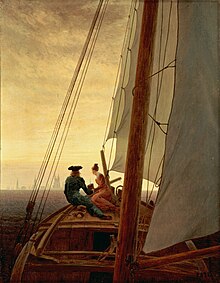Vasily Andreevich Zhukovsky
Vasily Zhukovsky ( Russian Василий Андреевич Жуковский ., Scientific transliteration Vasilij Andreevič Zukovskij ; born January 29, jul. / 9. February 1783 greg. On the estate Mischenskoje in Tula , central Russia, † April 12 jul. / 24. April 1852 greg . in Baden-Baden ) was a Russian poet and translator of Romanticism.
Life
Zhukovsky was the illegitimate son of a landlord named Bunin and a Turkish serf. It was named after his godfather Zhukovsky. He spent his youth in Moscow, where he frequented the house of the poet Nikolai Mikhailovich Karamsin . Its first publication was a translation of Thomas Gray's Elegy Written in a Country Church Yard (1802). This translation is generally considered to be the beginning of Russian Romanticism .
The majority of his publications are free translations of a large number of poets, from Firdausi to Friedrich Schiller . Schukowski was especially famous for his first-class, melodic translations of German and English ballads. One of his own ballads, Swetlana (1808), is considered a milestone in Russian poetry. It is dedicated to his niece, for whom he felt an unrequited love that overshadowed his private life for years.
In the Patriotic War against Napoléon Bonaparte in 1812, Zhukovsky joined the Russian army. As a result he wrote numerous patriotic works, including the tsar's hymn God save the tsar! , which was set to music by Alexei Fyodorowitsch Lwow .
In order to spread Karamsin's anti-classical aesthetic, he founded the humorous literary society “ Arsamas ”, of which the young Alexander Pushkin belonged. After his death, Schukowski took care of the publication of his posthumous works as executor.
In 1826 he was appointed tutor of the Tsarevich , who later became Tsar Alexander II. His influence on the latter is said to have been so great that Alexander's liberal reforms in the 1860s are sometimes attributed to Zhukovsky's upbringing. Zhukovsky used his high reputation at the St. Petersburg court to help rebellious authors such as Alexander Pushkin , Mikhail Lermontov , Alexander Herzen , Taras Shevchenko and the Decembrists .
In 1841 he withdrew from court for health reasons and moved to Germany (what would later become Villa Metzler, Frankfurt ), where he concentrated on the translation of Homer's Odyssey . The work was published in 1849. Also in 1841 he married Elisabeth von Reutern (1821–1856), the daughter of Gerhardt Wilhelm von Reutern . Their daughter, Alexandra Wassiljewna Schukowskaja, was born in 1842, and their son Paul von Joukowsky was born in 1845 . He spent the last years of his life with his new family, first in Düsseldorf and later in Frankfurt am Main .
Schukowski died in Baden-Baden in 1852, where he had lived in Palais Kleinmann at 5 Sophienstrasse from 1848. His body was transferred to Russia; he is buried in the cemetery of the Alexander Nevsky Convent in Saint Petersburg .
Art collector
The art collector Schukowski is considered to be the most important sponsor of Caspar David Friedrich and ensured the painter's economic survival, especially in his later creative years, through his own acquisitions and mediation for the Tsar's family. At the beginning of December 1820, Schukowski visited Friedrich for the first time in his Dresden studio. In 1830 he owned at least nine oil paintings by the German romantic. In his extensive collection of drawings there were 50 drawings by Friedrich. Significant works by Friedrich, which came to St. Petersburg through Zhukovsky's mediation, can now be viewed in the Hermitage , such as the paintings On the Sailor or The Sisters on the Söller at the harbor . Schukowski was one of the few contemporaries whom Friedrich gave insight into his creative process. After Friedrich's death, he provided financial support for the poor painter's widow from the Tsar.
Web links
- Literature by and about Wassili Andrejewitsch Schukowski in the catalog of the German National Library
- Works by and about Wassili Andrejewitsch Schukowski in the German Digital Library
- Works in full text at lib.ru (Russian)
Individual evidence
- ↑ Detlef Stapf: Caspar David Friedrichs hidden landscapes. The Neubrandenburg contexts . Greifswald 2014, p. 113, network-based P-Book .
- ^ Hermann Zschoche: Caspar David Friedrichs Rügen. A search for clues. Verlag der Kunst Dresden, Husum 2007, ISBN 978-3-86530-086-7 , p. 229
- ^ Helmut Börsch-Supan, Karl Wilhelm Jähnig: Caspar David Friedrich. Paintings, prints and pictorial drawings , Prestel Verlag, Munich 1973, ISBN 3-7913-0053-9 (catalog raisonné), p. 353
- ↑ Sigrid Hinz (Ed.): Caspar David Friedrich in letters and confessions . Henschelverlag Art and Society, Berlin 1974, p. 74
| personal data | |
|---|---|
| SURNAME | Zhukovsky, Wassili Andrejewitsch |
| ALTERNATIVE NAMES | Жуковский, Василий Андреевич (Russian); Žukovskij, Vasilij Andreevič |
| BRIEF DESCRIPTION | Russian poet and translator |
| DATE OF BIRTH | February 9, 1783 |
| PLACE OF BIRTH | Well Mischenskoje near Tula |
| DATE OF DEATH | April 24, 1852 |
| Place of death | Baden-Baden |


